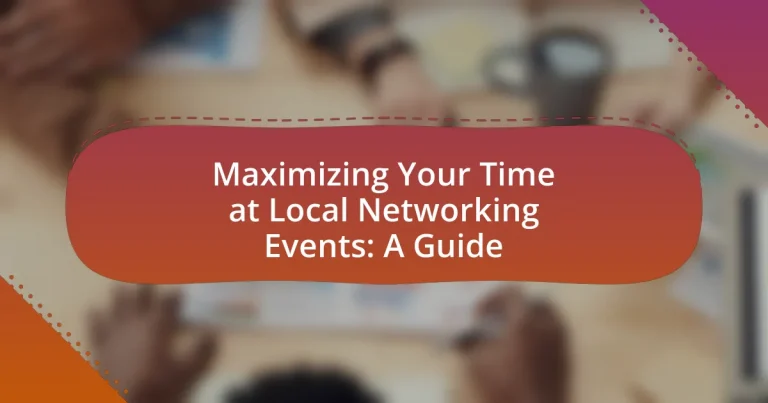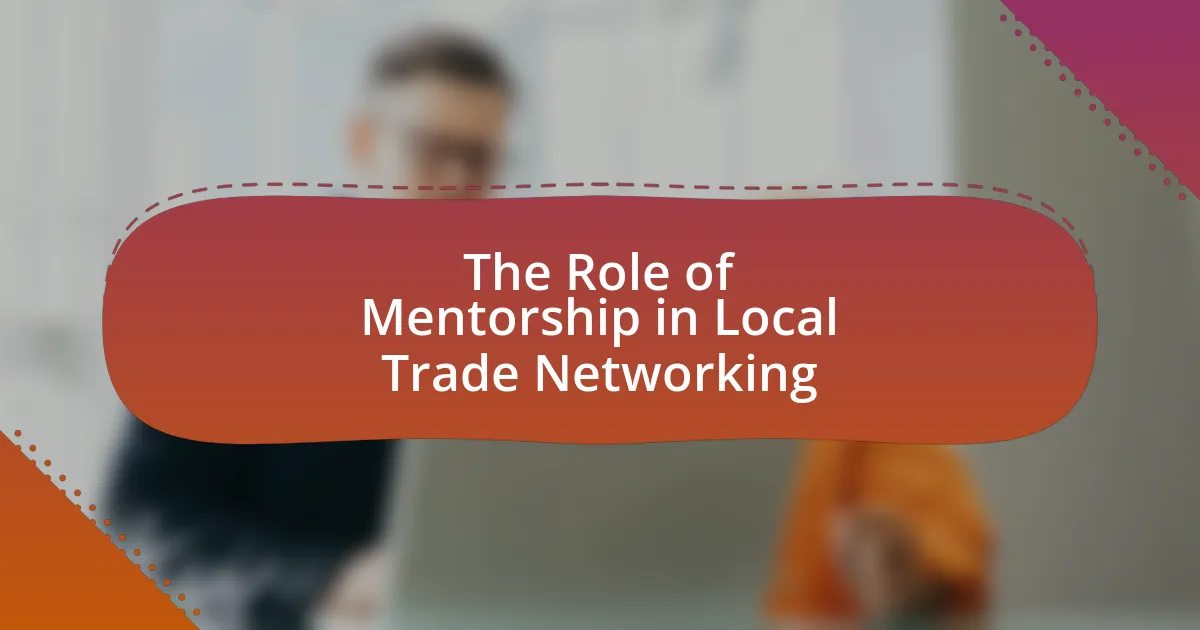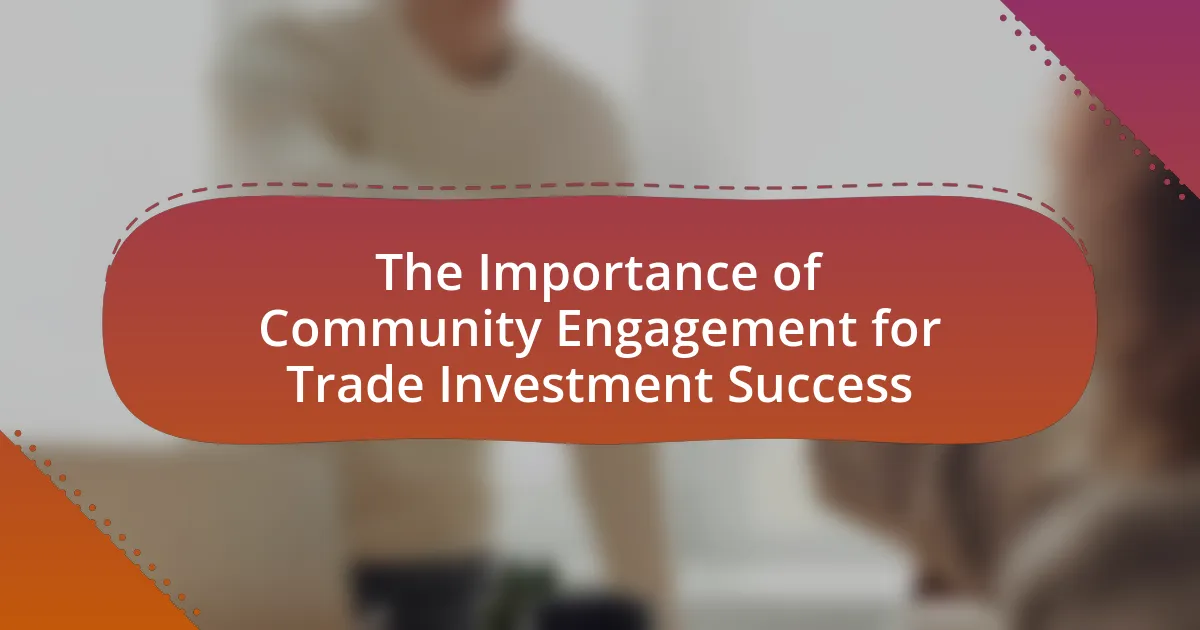Local networking events are gatherings aimed at fostering professional connections within a specific geographic area, encompassing activities such as workshops, seminars, and informal meetups. These events are crucial for career advancement, as they facilitate meaningful interactions that can lead to job opportunities and collaborations. The article outlines the significance of local networking events, the various types available, and effective strategies for preparation and engagement. It emphasizes the importance of setting clear goals, utilizing effective communication techniques, and following up with contacts to maximize networking success. Additionally, it highlights common pitfalls to avoid and best practices for making meaningful connections quickly.
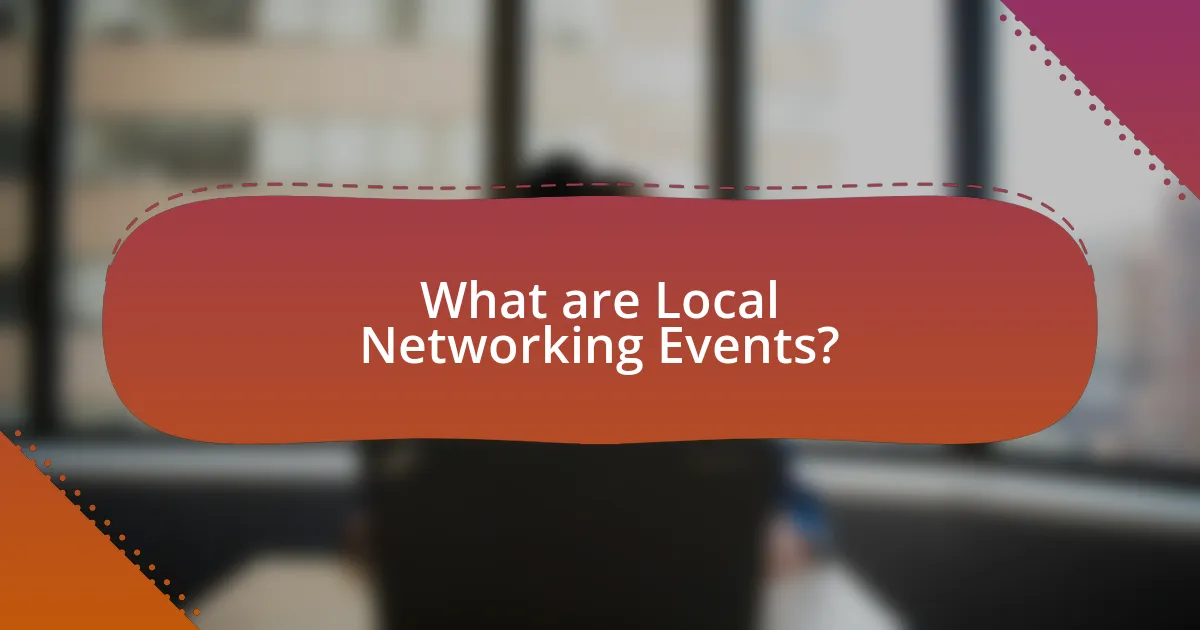
What are Local Networking Events?
Local networking events are gatherings designed to facilitate professional connections among individuals within a specific geographic area. These events typically include activities such as workshops, seminars, or informal meetups, allowing participants to share knowledge, exchange ideas, and build relationships that can lead to business opportunities. According to a survey by the Event Marketing Institute, 84% of professionals believe that in-person networking is essential for career success, highlighting the importance of these events in fostering community and collaboration.
Why are Local Networking Events important for professionals?
Local networking events are important for professionals because they facilitate meaningful connections that can lead to career advancement and collaboration opportunities. These events provide a platform for individuals to meet peers, industry leaders, and potential mentors, enhancing their professional network. According to a study by the Harvard Business Review, 70% of jobs are found through networking, highlighting the critical role these events play in career development. Additionally, local networking events often feature industry-specific discussions and workshops, allowing professionals to gain insights and knowledge that can directly impact their work.
What opportunities do Local Networking Events provide?
Local networking events provide opportunities for professional connections, knowledge sharing, and business growth. Attendees can meet industry peers, potential clients, and collaborators, which can lead to partnerships and referrals. Additionally, these events often feature speakers or workshops that offer insights into industry trends and best practices, enhancing participants’ skills and knowledge. According to a study by the Harvard Business Review, networking can significantly increase career advancement opportunities, demonstrating the tangible benefits of engaging in local networking events.
How do Local Networking Events differ from online networking?
Local networking events differ from online networking primarily in the mode of interaction; local events facilitate face-to-face communication, while online networking relies on digital platforms. Face-to-face interactions at local events allow for non-verbal cues, immediate feedback, and stronger personal connections, which can enhance relationship-building. In contrast, online networking often lacks these elements, making it more challenging to establish rapport and trust. Studies indicate that 85% of communication is non-verbal, underscoring the importance of in-person interactions for effective networking.
What types of Local Networking Events exist?
Local networking events include business mixers, industry-specific meetups, workshops, seminars, and conferences. Business mixers facilitate informal interactions among professionals, while industry-specific meetups focus on networking within particular sectors, such as technology or healthcare. Workshops provide hands-on learning experiences that also encourage networking, and seminars often feature expert speakers, allowing attendees to connect over shared interests. Conferences typically gather large groups for networking opportunities, presentations, and discussions, fostering connections across various fields. These event types are designed to enhance professional relationships and knowledge sharing within local communities.
What are the characteristics of industry-specific networking events?
Industry-specific networking events are characterized by their focus on a particular sector, facilitating targeted interactions among professionals within that field. These events typically feature specialized content, such as keynote speakers and panel discussions relevant to the industry, which enhances knowledge sharing and professional development. Additionally, attendees often include key stakeholders, decision-makers, and influencers from the industry, creating opportunities for meaningful connections and collaborations. The structured format of these events, including workshops and breakout sessions, encourages active participation and engagement, further solidifying relationships among peers.
How do social networking events facilitate connections?
Social networking events facilitate connections by providing a structured environment where individuals can meet, interact, and exchange information. These events often include activities such as icebreakers, discussions, and networking sessions that encourage participants to engage with one another. Research indicates that 70% of professionals believe networking is essential for career success, highlighting the importance of these events in building relationships and expanding professional networks.
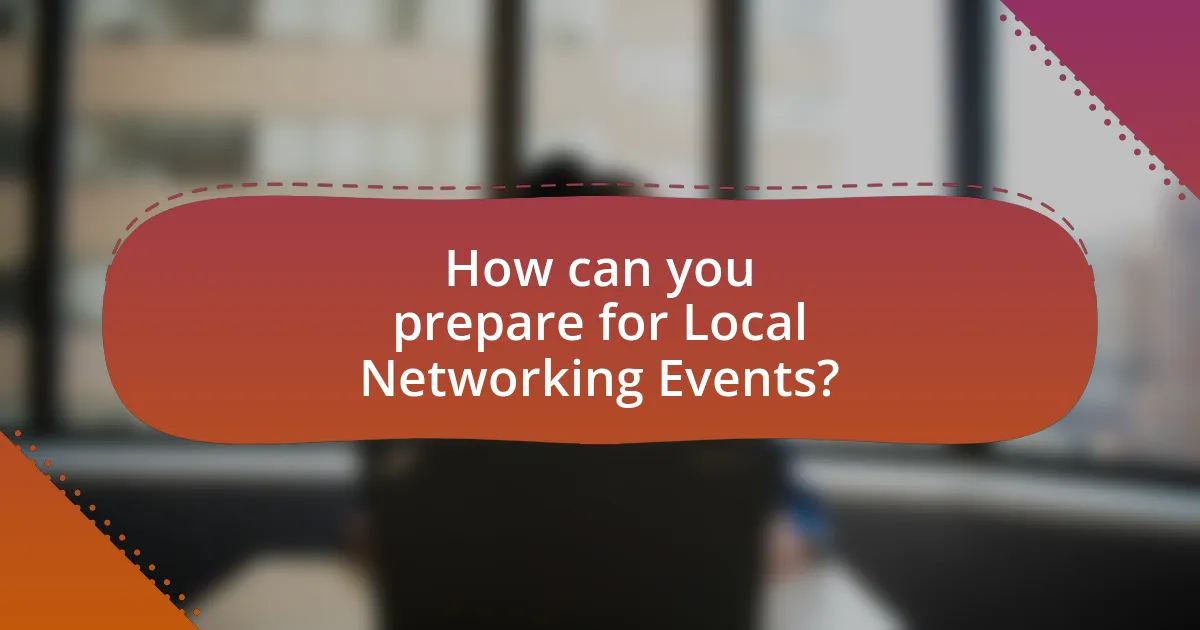
How can you prepare for Local Networking Events?
To prepare for local networking events, individuals should research the event details, including the attendees and speakers. This preparation allows participants to identify key contacts and tailor their conversations effectively. According to a study by the Harvard Business Review, networking can lead to job opportunities and collaborations, emphasizing the importance of strategic preparation. Additionally, practicing an elevator pitch and bringing business cards can enhance engagement and leave a lasting impression.
What strategies can enhance your networking experience?
To enhance your networking experience, actively engage in meaningful conversations and follow up with contacts afterward. Engaging in conversations allows for the establishment of genuine connections, which is crucial for effective networking. Following up reinforces these connections, as studies show that maintaining contact increases the likelihood of collaboration and support. For instance, a survey by LinkedIn found that 85% of jobs are filled through networking, highlighting the importance of building and nurturing relationships.
How do you set clear goals for attending a networking event?
To set clear goals for attending a networking event, first identify specific outcomes you want to achieve, such as making a certain number of new connections or learning about industry trends. This focused approach allows you to prioritize your interactions and maximize the value of your time at the event. Research indicates that individuals who set measurable goals are more likely to achieve them; for instance, a study by the Dominican University of California found that goal-setting significantly enhances performance and accountability. By defining your objectives in advance, you can navigate the event with purpose and clarity.
What materials should you bring to a networking event?
To a networking event, you should bring business cards, a notepad, and a pen. Business cards facilitate easy sharing of your contact information, which is essential for follow-up communication. A notepad allows you to jot down important details about conversations and connections made during the event, enhancing your ability to remember and engage with new contacts later. A pen is necessary for writing notes or exchanging information on the spot. These materials are commonly recognized as essential for effective networking, as they help establish connections and maintain communication.
How can you research attendees and speakers before the event?
To research attendees and speakers before the event, utilize social media platforms, event websites, and professional networking sites like LinkedIn. Social media platforms often provide insights into attendees’ interests and backgrounds, while event websites typically list speakers along with their bios and topics of discussion. LinkedIn can be particularly useful for understanding the professional history and connections of both attendees and speakers, allowing for targeted networking opportunities. According to a study by Eventbrite, 70% of attendees prefer to connect with speakers and other participants before an event, highlighting the importance of this research for effective networking.
What tools can help you identify key individuals to connect with?
Tools that can help identify key individuals to connect with include LinkedIn, Meetup, and professional networking apps like Shapr. LinkedIn allows users to search for professionals based on industry, location, and mutual connections, facilitating targeted outreach. Meetup enables users to find local events and groups aligned with their interests, providing opportunities to meet like-minded individuals. Shapr uses a swiping mechanism to match users with professionals in their area, enhancing networking potential. These tools are effective because they leverage existing networks and interests to connect individuals strategically.
How can understanding the event agenda improve your networking?
Understanding the event agenda enhances networking by allowing individuals to identify key sessions and attendees relevant to their goals. By reviewing the agenda, participants can prioritize which discussions to attend, ensuring they engage with influential speakers and potential collaborators. Research indicates that targeted networking, facilitated by a clear understanding of event structure, increases the likelihood of meaningful connections, as attendees can align their conversations with shared interests and objectives.
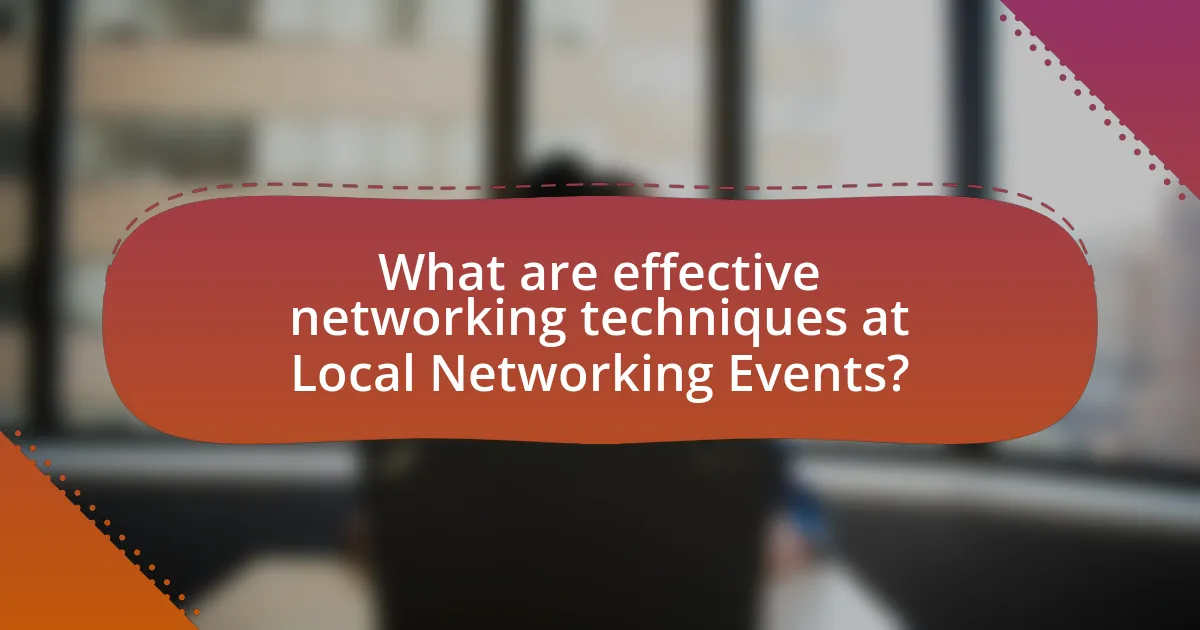
What are effective networking techniques at Local Networking Events?
Effective networking techniques at local networking events include actively engaging in conversations, utilizing open body language, and following up with contacts after the event. Engaging in conversations allows individuals to establish rapport and share valuable information, which is essential for building professional relationships. Open body language, such as maintaining eye contact and smiling, fosters a welcoming atmosphere that encourages interaction. Following up with contacts through emails or social media reinforces connections made during the event, increasing the likelihood of future collaboration. Research indicates that 70% of jobs are found through networking, highlighting the importance of these techniques in professional success.
How can you initiate conversations with new contacts?
To initiate conversations with new contacts, start with a friendly greeting and introduce yourself clearly. Engaging in small talk about the event or mutual interests can create a comfortable atmosphere. Research indicates that open-ended questions encourage dialogue; for example, asking about their experience at the event can lead to deeper discussions. According to a study by the Journal of Business Communication, effective networking relies on establishing rapport through genuine interest and active listening, which fosters meaningful connections.
What icebreakers can help you start a conversation?
Effective icebreakers that can help start a conversation include asking open-ended questions, sharing a fun fact, or commenting on the environment. Open-ended questions, such as “What brings you to this event?” encourage detailed responses and engagement. Sharing a fun fact, like “Did you know that networking can increase your chances of job success by 70%?” can spark interest and dialogue. Additionally, commenting on the venue or event, such as “This place has a great atmosphere, have you been here before?” creates a relatable context for conversation. These strategies are supported by research indicating that effective communication techniques enhance networking success.
How do you maintain engaging conversations during networking?
To maintain engaging conversations during networking, actively listen and ask open-ended questions. Active listening demonstrates genuine interest, encouraging the other person to share more about their experiences and insights. Open-ended questions, such as “What projects are you currently excited about?” invite detailed responses, fostering deeper dialogue. Research indicates that effective networking relies on meaningful exchanges, with studies showing that conversations that involve active engagement lead to stronger professional relationships.
What follow-up strategies should you implement after the event?
To effectively follow up after an event, implement strategies such as sending personalized thank-you emails, connecting on social media, and scheduling one-on-one meetings. Personalized thank-you emails reinforce connections and show appreciation, which can lead to stronger relationships; studies indicate that personalized communication increases engagement by 26%. Connecting on social media platforms like LinkedIn allows for ongoing interaction and visibility, enhancing professional networks. Scheduling one-on-one meetings provides an opportunity for deeper discussions and collaboration, which can result in mutually beneficial outcomes. These strategies collectively enhance networking effectiveness and foster long-term professional relationships.
How can you effectively follow up with new connections?
To effectively follow up with new connections, send a personalized message within 24 to 48 hours after meeting them. This prompt communication reinforces the connection and shows genuine interest. Research indicates that timely follow-ups increase the likelihood of maintaining professional relationships, with a study by the Harvard Business Review highlighting that 70% of people prefer to receive follow-up messages shortly after an initial meeting. Personalizing the message by referencing specific topics discussed can further enhance engagement and strengthen the relationship.
What tools can assist in managing your networking contacts?
Tools that can assist in managing your networking contacts include customer relationship management (CRM) software, contact management apps, and digital business card applications. CRM software like Salesforce or HubSpot allows users to organize and track interactions with contacts, providing insights into relationship management. Contact management apps such as Contacts+ or FullContact enable users to store and categorize contact information efficiently. Digital business card applications like CamCard or Haystack facilitate easy sharing and storing of contact details, streamlining the networking process. These tools enhance organization and accessibility, making it easier to maintain and leverage professional relationships.
What common mistakes should you avoid at Local Networking Events?
Common mistakes to avoid at local networking events include failing to prepare an elevator pitch, neglecting to follow up with contacts, and being overly focused on selling rather than building relationships. Preparation is crucial; having a concise elevator pitch allows for effective communication of your value. Research indicates that 80% of networking success comes from follow-up, highlighting the importance of maintaining connections after the event. Additionally, prioritizing relationship-building over immediate sales fosters trust and long-term collaboration, which is essential for successful networking.
How can over-enthusiasm hinder your networking efforts?
Over-enthusiasm can hinder networking efforts by overwhelming potential connections and creating discomfort. When individuals exhibit excessive eagerness, they may dominate conversations, making it difficult for others to engage or express their own thoughts. This behavior can lead to perceptions of insincerity or desperation, which can deter meaningful interactions. Research indicates that effective networking relies on balanced communication, where active listening and mutual exchange are prioritized. For instance, a study published in the Journal of Business and Psychology highlights that successful networking is characterized by reciprocity and genuine interest, rather than one-sided enthusiasm.
What are the pitfalls of not listening during conversations?
Not listening during conversations leads to misunderstandings and missed opportunities. When individuals fail to actively engage in listening, they may misinterpret the speaker’s message, resulting in incorrect assumptions or responses. This lack of comprehension can damage relationships and hinder effective communication, as studies indicate that poor listening skills contribute to 70% of workplace conflicts. Additionally, not listening can cause individuals to overlook valuable insights or networking opportunities, as they may miss key information that could enhance their professional connections.
What are the best practices for maximizing your time at Local Networking Events?
To maximize your time at local networking events, prepare in advance by setting clear goals for what you want to achieve. This includes identifying key individuals you wish to connect with and specific topics you want to discuss. Researching attendees and their backgrounds can enhance your conversations and make them more meaningful. Engaging actively in discussions and asking open-ended questions fosters deeper connections. Additionally, following up with new contacts after the event solidifies relationships and opens doors for future collaboration. Studies show that effective networking can lead to increased opportunities, with 70% of jobs being found through networking, highlighting the importance of strategic engagement at these events.
How can you prioritize your networking goals during the event?
To prioritize your networking goals during the event, first, clearly define your objectives, such as meeting specific individuals, expanding your industry knowledge, or seeking potential collaborations. This focused approach allows you to allocate your time effectively, ensuring that you engage with the most relevant contacts. For instance, if your goal is to connect with industry leaders, research their attendance beforehand and plan to approach them during key moments, such as breaks or panel discussions. Studies show that having a clear networking strategy increases the likelihood of meaningful connections, as individuals who set specific goals are 50% more likely to achieve them compared to those without a plan.
What techniques can help you make meaningful connections quickly?
To make meaningful connections quickly, actively engage in conversations by asking open-ended questions and practicing active listening. Open-ended questions encourage deeper dialogue, allowing individuals to share more about themselves, which fosters a sense of connection. Active listening, demonstrated by nodding and summarizing what the other person says, shows genuine interest and builds rapport. Research indicates that effective communication techniques, such as these, can significantly enhance relationship-building in networking settings, as they create an environment where individuals feel valued and understood.
